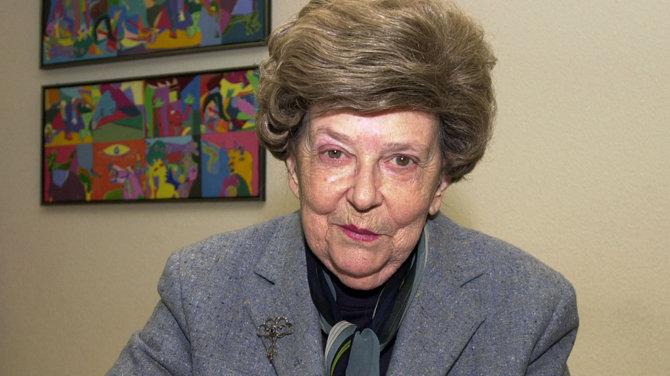by FRANCESCO GRECO – IOWA CITY – America “discovers” Maria Corti. One of the most fascinating and multifaceted figures in late 20th century Italian cultural and intellectual life has been picked up for translation for an English-reading audience. Maria Corti (Milan, September 7 1915 – February 22 2002), the writer, semiologist, literary critic, professor, and partisan, whose father Emilio was an engineer and whose mother, Celestina Goldoni, was a pianist, is in the process of being translated by Julia Conrad, herself a writer, translator, educator, and former literary agent, whose mother Diana Horowitz is a painter, and father is a music teacher. Conrad’s work, her website says, “engages with feminism, sexuality, classical music, meat, archives, and humor as an entry-point into social criticism.” She has received fellowships from Vermont Studio Center, University of Iowa, and Wesleyan University, as well as MFAs (Masters of Fine Arts) from the University of Iowa in Nonfiction and Literary Translation. She has also been an active violin player in Iowa, New York, and Milan.
Her other translation projects include the Sicilian writer Gesualdo Bufalino’s Museo d’Ombre and short stories by the Italo-Ghanaian writer, musician, and activist Djarah Kan.
How and when did you first hear of Maria Corti?
“A friend of mine from Salento, where many of Corti’s books are set, recommended her to me while we were walking down the street in New York. After doing more research and realizing the full extent of who she was, I was shocked that I had never heard of her before, whether for her novels or her criticism. In addition to being a reader and translator of Italian literature, I studied semiotics at University of Bologna—so it was bittersweet to be introduced to one of the key figures who introduced semiotics to Italy, and who founded the most important archive of Italian 20th century literature, the Centro Manoscritti. I felt like I should have known about her years ago, and have read her work in conversation with the other critics and authors I was studying at the time”.
Is the Milanese writer well-known in the United States?
“Corti is mostly unknown in the US, especially compared to Umberto Eco, her contemporary both in the field of semiotics and the historical-philosophical novel. Most of Eco’s work is available in English—which opens to cross-reference and a self-sustaining reputation—while out of Corti’s twenty-seven books, only L’Ora di Tutti (published as Otranto in 2009) and Principi della comunicazione letteraria (Introduction to Literary Semiotics, 1976) have been translated. The impact of Corti’s Principi was further weakened by imprecisions in the translation itself, as has been outlined in a review of the book. To me this also speaks to a larger dynamic: that an upsettingly small number of translations are published in the US. Out of around one million books published annually here, only around 3% are in translation, and about .01% are the work of women authors in translation”.
What made you decide to translate her work?
“I’m drawn to the infectious curiosity in her work, and how she translates research into art. Her smallest word choices and references open into an array of histories and cultures. I chose Il Canto delle Sirene (The Siren Song) in particular because it makes a compelling argument about the siren myth through the form of a novel. The sirens of antiquity were not the seductresses with fish tails and irresistible voices we think of today, but instead half-bird killers who seduced sailors with their supernatural knowledge and musical prowess. In other words, the sirens were originally dangerous and desirable for what they promised intellectually, rather than physically, as opposed to their current representation as femme fatale figures. Many writers, from Kafka to Borges to Tomasi di Lampedusa have written about sirens, but Corti is the first to really examine the theme of intellectual seduction, and give the sirens their own point of view. Given how the majority of classical myths come to us through the voices of male storytellers, I find it exciting to re-encounter the myth from a woman’s perspective”.
Which aspects of Corti’s role as a writer, philologist, and cultural figure do you find most interesting or attractive?
“I’m interested in how she is always blurring boundaries, whether between disciplines, genres, ways of life, even Northern and Southern Italy. Even though she was one of the most erudite thinkers in 20th century Italian letters, she hated narcissism and snobbery. Her literary research often had a spirit of physical adventure: from tracking down Medieval scrolls mistaken for German documents during the war, to fishing at dawn with Otranto’s fishermen. Given her childhood spent partially in a convent in Lombardia and partially in Puglia with her father, she writes acutely about both Northern and Southern Italy. Above all, her scholarly work has a clear, almost literary style, and her novels always share the discoveries of her scholarship. There’s a sense of generosity in her writing that I really admire. I never feel like she’s performing her knowledge for acclaim, but with the genuine aim of sharing it”.
And of her life as a woman and activist in the context of 20th century Italian and European literature?
“Because in America there is a lot of discussion centered on identity politics, I’ve been thinking a great deal about Corti in relationship to Italian feminism, which she didn’t overtly identify with, even while her actions and work were groundbreaking. In Dialogo in Pubblico she quotes Madame de Staël’s adage, “The brain has no gender,” and does not view her writing as part of “scrittura femminile,” linked with writers like Dacia Maraini. Yet whether or not Corti identified as feminist, she often wrote bluntly about prejudices against women in the Italian literary and academic world in the 20th century, and worked tenaciously even in inhospitable circumstances. When she was starting her career, Fascist laws banned women from teaching at either the high school or university level, so instead during that period she got another degree in philosophy, supported herself by teaching middle school, and was active in anti-Fascist circles. She was often the only woman in the prestigious academic and literary groups she took part in, and later supported younger female scholars. “Nothing is as unforgiveable as merit,” Veronica says at the end of Il Canto delle Sirene about the struggle of women in academia. I hope that when it comes to Maria Corti merit has the last word—in the incredibly varied and rich body of work she left behind”.







Leave a Reply